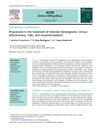 1 citations,
January 2023 in “Metabolites”
1 citations,
January 2023 in “Metabolites” Changes in gut bacteria can contribute to the development of Polycystic Ovary Syndrome (PCOS), affecting metabolism, immunity, and causing inflammation. Treatments may involve adjusting these factors.
 August 2023 in “Journal of Clinical Medicine”
August 2023 in “Journal of Clinical Medicine” Metformin lowers prolactin in women without PCOS but not in those with PCOS, where it reduces other hormones instead.
4 citations,
July 2017 in “Journal of Medical Case Reports” The 2012 criteria are better for diagnosing atypical lupus cases.
 March 2013 in “Journal of pediatric nursing”
March 2013 in “Journal of pediatric nursing” The case emphasizes the need for careful screening in children for insulin resistance and related conditions.
 41 citations,
June 2016 in “Reviews in endocrine and metabolic disorders”
41 citations,
June 2016 in “Reviews in endocrine and metabolic disorders” Hidradenitis suppurativa may be related to hormones and patients often have metabolic disorders; more research is needed to understand this connection.
 31 citations,
January 2017 in “Advances in Experimental Medicine and Biology”
31 citations,
January 2017 in “Advances in Experimental Medicine and Biology” Low testosterone and 5α-reductase inhibitors can harm men's metabolic and sexual health; testosterone therapy may help, but discussing 5α-RIs' side effects is important.
 27 citations,
December 2015 in “Mayo Clinic Proceedings”
27 citations,
December 2015 in “Mayo Clinic Proceedings” The document concludes that lifestyle changes and medical treatments can significantly reduce symptoms of Hidradenitis Suppurativa, a chronic skin condition.
 16 citations,
December 2011 in “Actas Dermo-Sifiliográficas”
16 citations,
December 2011 in “Actas Dermo-Sifiliográficas” Propranolol is effective and safe for treating infantile hemangioma, but more research is needed for dosing and monitoring guidelines.
 6 citations,
December 2022 in “International Journal of Molecular Sciences”
6 citations,
December 2022 in “International Journal of Molecular Sciences” Hormone imbalance is linked to Hidradenitis Suppurativa, a skin condition, and treatments like anti-androgenic therapy and metformin can help. It's also suggested to check patients for insulin resistance and Polycystic Ovary Syndrome.
 2 citations,
September 2018 in “Clinical Pediatrics”
2 citations,
September 2018 in “Clinical Pediatrics” Most inconsolable crying in infants is not due to a serious cause, and a detailed check-up is typically enough to find the reason.
 1 citations,
April 2018 in “Revista da Sociedade Portuguesa de Dermatologia e Venereologia”
1 citations,
April 2018 in “Revista da Sociedade Portuguesa de Dermatologia e Venereologia” Hidradenitis suppurativa is a chronic skin condition more common in women, linked to genetics and lifestyle factors, and associated with various other health issues.
 1 citations,
January 2014 in “Springer eBooks”
1 citations,
January 2014 in “Springer eBooks” Adult acne is more common in women, often linked to hormones, and can be harder to treat.
 1 citations,
March 2011 in “Informa Healthcare eBooks”
1 citations,
March 2011 in “Informa Healthcare eBooks” Hormonal therapy is effective for treating acne in adult women, especially with signs of high androgen levels.
 January 2018 in “Springer eBooks”
January 2018 in “Springer eBooks” Hidradenitis Suppurativa is likely an autoinflammatory disease, and better understanding its causes could improve treatments.
 October 2010 in “Reproductive Biomedicine Online”
October 2010 in “Reproductive Biomedicine Online” Women with pituitary adenomas often have reproductive issues, like irregular periods and trouble getting pregnant, but not always breast milk production without pregnancy.
 116 citations,
December 2017 in “International Journal of Women's Dermatology”
116 citations,
December 2017 in “International Journal of Women's Dermatology” Adult female acne treatment should be personalized, considering individual preferences and pregnancy, using various topical and oral medications while managing side effects and resistance.
 12 citations,
October 1995 in “The Journal of Clinical Endocrinology & Metabolism”
12 citations,
October 1995 in “The Journal of Clinical Endocrinology & Metabolism” Skin changes can indicate hormonal imbalances and help diagnose endocrine disorders.
 3 citations,
September 2005 in “Experimental dermatology”
3 citations,
September 2005 in “Experimental dermatology” The cornified envelope is crucial for skin's barrier function and involves key proteins and genetic factors.
 2 citations,
September 2015 in “Clínica e Investigación en Arteriosclerosis”
2 citations,
September 2015 in “Clínica e Investigación en Arteriosclerosis” Some skin conditions may increase the risk of heart disease, but are not yet included in cardiovascular prevention guidelines.
 9 citations,
November 1978 in “Diabetes Care”
9 citations,
November 1978 in “Diabetes Care” The document concludes that a high-protein, low-carb diet can lead to significant weight loss but requires caution and further research.
 4 citations,
November 2016 in “Pediatric Clinics of North America”
4 citations,
November 2016 in “Pediatric Clinics of North America” The document explains the difficulty in diagnosing and treating brain diseases caused by the immune system and stresses the need for quick and accurate tests.
 September 2023 in “Deleted Journal”
September 2023 in “Deleted Journal” Post-bariatric surgery patients often face gastrointestinal issues, fatigue, dry skin, hair loss, and anxiety.
 2 citations,
January 2019 in “Medizinische Genetik”
2 citations,
January 2019 in “Medizinische Genetik” The document reports findings on genetic research, including ethical concerns about genome editing, improved diagnosis of mitochondrial mutations, solving inherited eye diseases, confirming gene roles in epilepsy, linking a gene to aneurysms, and identifying genes associated with age-related macular degeneration.

Clinicians should look for skin issues, sleep problems, cognitive changes, and food cravings as signs of insulin resistance.
 November 2022 in “CARDIOMETRY”
November 2022 in “CARDIOMETRY” A group has developed therapies that show promise for treating cancer and various other conditions.
 October 2015 in “Elsevier eBooks”
October 2015 in “Elsevier eBooks” Aldesleukin can treat certain cancers and increase HIV patient CD4+ counts but often causes severe side effects.
8 citations,
June 2016 in “PubMed” Finasteride is effective and safe for treating hidradenitis suppurativa in both adults and some younger patients.
 3 citations,
January 2023 in “American journal of physiology. Cell physiology”
3 citations,
January 2023 in “American journal of physiology. Cell physiology” Inward rectifier potassium channels are important in many body functions and diseases, and could be potential drug targets.
 3 citations,
November 2021 in “Applied Microscopy”
3 citations,
November 2021 in “Applied Microscopy” Hair microscopy is a simple and cost-effective method to help diagnose systemic diseases in children.
29 citations,
June 2020 in “International Journal of Molecular Sciences” Notch signaling disruptions can cause various skin diseases.


























